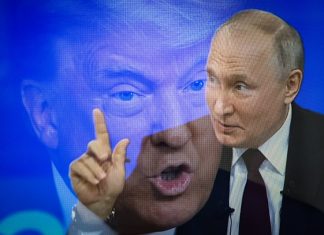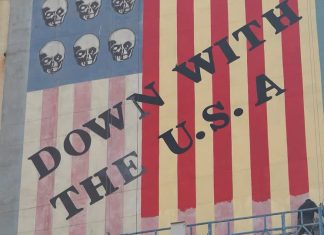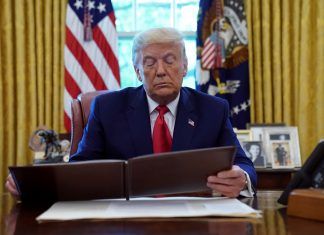By Parisa Hafezi and John Irish
VIENNA, Dec 14 (Reuters) – Three European powers said on Tuesday “we are rapidly reaching the end of the road” to save the 2015 Iran nuclear deal as Tehran accused Western powers of engaging in a “blame game.”
The comments suggest indirect U.S.-Iran talks on preserving the pact under which Iran limited its nuclear program in return for relief from economic sanctions may be approaching collapse, with all sides seeking to avoid being held responsible.
“Iran‘s continued nuclear escalation means that we are rapidly reaching the end of the road,” France’s ambassador to the United Nations, Nicolas de Riviere, said at the world body, reading a joint statement from Britain, France and Germany.
“We are nearing the point where Iran’s escalation of its nuclear programme will have completely hollowed out the JCPoA,” he added, referring to the pact, named the Joint Comprehensive Plan of Action.
Iran cast itself as the aggrieved party as a result of then-U.S. President Donald Trump’s 2018 decision to abandon the deal and reimpose harsh U.S. sanctions, a move that prompted Tehran to begin violating its nuclear restrictions about a year later.
On Twitter, Iran‘s top nuclear negotiator, Ali Bagheri Kani, wrote: “Some actors persist in their blame game habit, instead of real diplomacy. We proposed our ideas early, and worked constructively and flexibly to narrow gaps.”
Referring to the 2018 U.S. withdrawal, he wrote: “Diplomacy is a two-way street. If there’s real will to remedy the culprit’s wrongdoing, the way for a quick, good deal will be paved.”
U.S. Secretary of State Antony Blinken said Washington continues to pursue diplomacy with Iran because “it remains, at this moment, the best option”, but added that it was “actively engaging with allies and partners on alternatives”.
The stakes are high. Failure would carry the risk of a new regional war. Israel, which has twice attacked the nuclear facilities of Arab nations, is pushing for a tough policy if diplomacy fails to rein in Iran’s nuclear work.
Indirect talks between Iran and the United States started in April but stopped in June after the election of hardline cleric Ebrahim Raisi, whose negotiators returned to Vienna after five months with an uncompromising stance.
Iran‘s Ambassador to the United Nations Majid Takht Ravanchi said Tehran exercised “maximum restraint” after the U.S. withdrawal and “paid a heavy price” to try to preserve the deal.
“Asking for objective and verifiable guarantees from the party responsible for the whole mess before us is absolutely warranted and necessary,” he told the world body.
Iran‘s clerical rulers believe a tough approach, spearheaded by their strongly anti-Western Supreme Leader Ayatollah Ali Khamenei, can force Washington to accept Tehran’s “maximalist demands”, analysts and diplomats said.
“But it could backfire. This is a very dangerous and sensitive issue. Failure of diplomacy will have consequences for everyone,” said a diplomat in the Middle East, speaking on condition of anonymity.
ANALYSIS: Will Iran Nuclear Deal Talks in Vienna Produce Results This Time?
SIGNIFICANT GAPS
During the seventh round of talks, which began on Nov. 29, Iran abandoned any compromises it had made in the previous six, and demanded more from others, a senior U.S. official said.
With significant gaps remaining between Iran and the United States on some key issues – such as the speed and scope of lifting sanctions and how and when Iran will reverse its nuclear steps – chances of an agreement seem remote.
Iran insists on immediate removal of all sanctions in a verifiable process. Washington has said it would remove curbs “inconsistent” with the nuclear pact if Iran resumed compliance, implying it would leave in place others such as those imposed under terrorism or human rights measures.
Iran also seeks guarantees that “no U.S. administration” will renege on the pact again. But U.S. President Joe Biden cannot promise this because the nuclear deal is a non-binding political understanding, not a legally binding treaty.
Dramatically upping the ante, Iran has also limited access given to U.N. nuclear watchdog inspectors under the nuclear deal, restricting their visits to declared nuclear sites only.
However, a spokesman for the Iranian foreign ministry told state-run Press TV an understanding with the Vienna-based International Atomic Energy Agency could come soon.
(Additional reporting by John Irish in Doha; Humeyra Pamuk in Jakarta; Nayera Abdallah in Cairo; and Arshad Mohammed and Daphne Psaledakis in Washington; Writing by Parisa Hafezi and Arshad Mohammed; Editing by Lincoln Feast, Robert Birsel, Raissa Kasolowsky and Dan Grebler)






